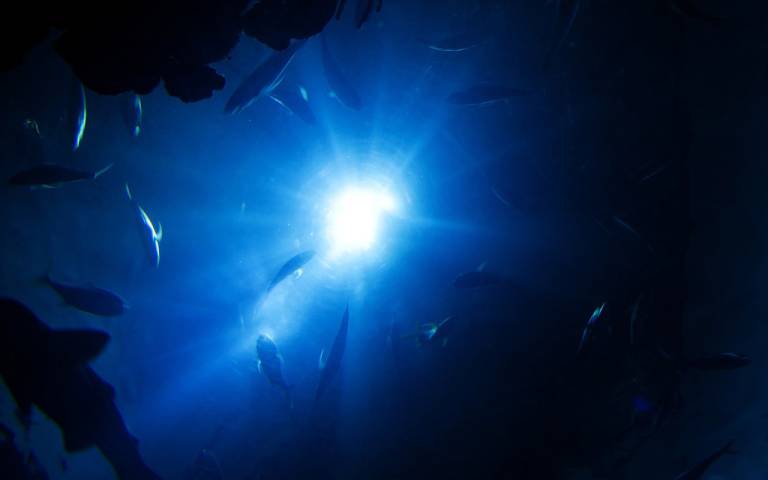Ocean’s twilight zone at risk from climate change
27 April 2023
Life in the ocean’s “twilight zone” could decline dramatically due to climate change, suggests a new study involving UCL researchers.

The twilight zone (200m to 1,000m deep) gets very little light but is home to a wide variety of organisms and billions of tonnes of organic matter.
The new study, published in the journal Nature Communications, warns that climate change could cause a 20-40% reduction in twilight zone life by the end of the century.
And in a high-emissions future, life in the twilight zone could be severely depleted within 150 years, with no recovery for thousands of years.
The research team, made up of palaeontologists and ocean modellers, looked at how abundant life was in the twilight zone in past warm climates, using records from preserved microscopic shells in ocean sediments.
Co-author Professor Bridget Wade (UCL Earth Sciences) said: “We used microscopic fossils, which are roughly the size of a grain of sand, to reconstruct food supply to the twilight zone in the Earth's past.
"Our study showed that in past warm oceans less organic matter (food) reached the twilight zone.
"Our models indicate that life in the twilight zone will be at risk in the future and it will take thousands of years to recover."
Professor Paul Pearson (UCL Earth Sciences), who led the research while at Cardiff University, said: “We looked at two warm periods in the Earth’s past, about 50 million years ago and 15 million years ago.
“We found that the twilight zone was not always a rich habitat full of life.
“In these warm periods, far fewer organisms lived in the twilight zone, because much less food arrived from surface waters.”
Animals in the twilight zone mainly feed on particles of organic matter that have sunk down from the ocean surface.
The study showed that in warmer seas of the past, this organic matter was degraded much faster by bacteria – meaning less food reached the twilight zone.
Lead author Dr Katherine Crichton, from the University of Exeter, explained: “The rich variety of twilight zone life evolved in the last few million years, when ocean waters had cooled enough to act rather like a fridge, preserving the food for longer, and improving conditions allowing life to thrive.”
This led the researchers to ask what will happen to life in the twilight zone in a future, warmer world.
Combining the evidence on past warm periods with Earth System Model simulations, they simulated what might be happening now in the twilight zone, and what could happen in future decades, centuries and millennia due to climate warming driven by greenhouse gas emissions.
Dr Crichton continued: “Our findings suggest that significant changes may already be under way.
“Unless we rapidly reduce greenhouse gas emissions, this could lead to the disappearance or extinction of much twilight zone life within 150 years, with effects spanning millennia thereafter.
“Even a low-emissions future may have a significant impact, but that would be far less severe than medium- and high-emissions scenarios.
“Our study is a first step to finding out how vulnerable this ocean habitat may be to climate warming.”
The study’s three emissions scenarios are based on total carbon dioxide emissions after 2010. “Low” is 625 billion tonnes, “medium” is 2,500 billion tonnes, and “high” is 5,000 billion tonnes.
For context, the Global Carbon Budget (led by the University of Exeter) estimated total global carbon dioxide emissions of 40.6 billion tonnes in 2022 alone.
Emissions have been close to 40 billion tonnes every year from 2010-22, so most of the carbon dioxide (about 500 billion tonnes) for the study’s “low” scenario has already been emitted.
At the current rate, the “medium” scenario would be reached 50 years from now, and the “high” in just over a century.
To increase our knowledge on the ocean twilight zone, a UN programme (JETZON) has been set up. It states: “It is poorly understood from almost any perspective. However, it contains possibly the world’s largest and least exploited fish stock and recycles ~80% of the organic material that sinks out of the productive surface waters.”
The new study was funded by the Natural Environment Research Council and involves researchers from UCL Earth Sciences as well as the universities of Exeter, Liverpool, California Riverside, Bremen and Cardiff.
Links
- Full paper in Nature Communications
- Professor Bridget Wade’s academic profile
- UCL Earth Sciences
- UCL Mathematical & Physical Sciences
Source
Image
- Image by PublicDomainPictures from Pixabay
Media contact
Mark Greaves
T: +44 (0)7990 675947
E: m.greaves [at] ucl.ac.uk
 Close
Close

